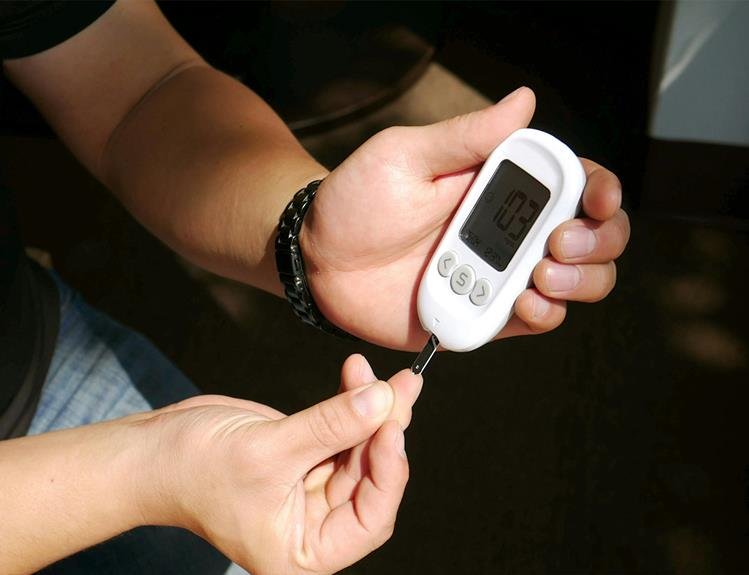Understanding Diabetes Neuropathy: Causes and Symptoms
When it comes to diabetes neuropathy, it's like navigating a complex maze where causes and symptoms intertwine like intricate threads.
The silent progression of nerve damage in diabetes can often go unnoticed until symptoms manifest themselves. Understanding the intricate web of factors that contribute to this condition is crucial for early detection and effective management.
Unraveling the mysteries behind why diabetes leads to neuropathy holds the key to better outcomes and improved quality of life for those affected.
Diabetes and Neuropathy Relationship
If you have diabetes, your nerves can be affected, leading to a condition known as neuropathy. This occurs due to prolonged high blood sugar levels that can damage the tiny blood vessels essential for nerve function. The relationship between diabetes and neuropathy is profound, with uncontrolled blood sugar levels being a significant risk factor for developing this condition.
When your nerves are damaged, you may experience symptoms such as tingling, numbness, or pain in the affected areas. It commonly affects the feet and legs but can also impact other parts of the body. Understanding this relationship is crucial because managing diabetes effectively through medication, diet, and lifestyle changes can help prevent or slow down the progression of neuropathy.
Regular monitoring of blood sugar levels, maintaining a healthy weight, and staying physically active are key steps in managing diabetes and reducing the risk of neuropathy. By taking control of your diabetes, you can minimize the impact it has on your nerves and overall quality of life.
Types of Diabetic Neuropathy
There are several types of diabetic neuropathy that can affect individuals with diabetes.
The first type is peripheral neuropathy, which is the most common form and typically affects the feet and legs. Symptoms may include numbness, tingling, or pain in these areas.
Autonomic neuropathy is another type that affects the nerves that control involuntary bodily functions like digestion, heart rate, and blood pressure. This can lead to issues such as gastroparesis or orthostatic hypotension.
Proximal neuropathy affects the hips, thighs, or buttocks and can cause severe pain, weakness, or numbness.
Focal neuropathy is different as it affects a single nerve, often in the wrist, thigh, or foot, causing sudden pain or weakness in that specific area.
Understanding the different types of diabetic neuropathy is crucial in managing the condition effectively and seeking appropriate treatment to alleviate symptoms and prevent further complications.
Risk Factors for Neuropathy
If you have diabetes, you face an increased risk of developing neuropathy. Your lifestyle choices, such as smoking and excessive alcohol consumption, can impact the progression of neuropathy.
It's crucial to understand prevention strategies to manage and potentially avoid the onset of neuropathy.
Diabetes and Neuropathy Risk
Diabetes significantly increases the risk of developing neuropathy, a condition that affects the nerves in the body. High blood sugar levels over time can damage the tiny blood vessels that supply the nerves, leading to nerve damage.
Poorly managed diabetes, especially over an extended period, heightens the likelihood of developing neuropathy. Additionally, factors such as high blood pressure, smoking, and obesity can exacerbate the risk of neuropathy in individuals with diabetes.
Genetics also play a role, as some people may be more predisposed to nerve damage due to their family history. Regular monitoring of blood sugar levels, maintaining a healthy lifestyle, and following your healthcare provider's recommendations can help reduce the risk of neuropathy associated with diabetes.
Lifestyle Impact on Neuropathy
High blood pressure, smoking, and obesity are lifestyle factors that can significantly increase the risk of developing neuropathy in individuals with diabetes. High blood pressure can damage blood vessels that supply nutrients to nerves, leading to nerve damage.
Smoking restricts blood flow to the extremities, depriving nerves of vital oxygen and nutrients. Obesity can contribute to inflammation and metabolic abnormalities that can directly damage nerves over time.
Poorly managed blood sugar levels, often associated with an unhealthy lifestyle, can further exacerbate neuropathy. By addressing these lifestyle factors through regular exercise, a balanced diet, and smoking cessation, individuals with diabetes can reduce their risk of developing neuropathy and improve their overall quality of life.
Prevention Strategies for Neuropathy
To minimize your risk of developing neuropathy, focus on implementing preventive strategies that target lifestyle factors and risk factors associated with the condition. Control your blood sugar levels through proper diet, exercise, and medication adherence.
Maintain a healthy weight to reduce strain on nerves and blood vessels. Regular physical activity can improve circulation and nerve health. Avoid smoking and limit alcohol consumption, as these can worsen neuropathy symptoms.
Monitor your blood pressure and cholesterol levels to prevent complications that could lead to nerve damage. Be proactive in managing any existing medical conditions like diabetes or autoimmune diseases that may increase neuropathy risk.
Prioritize self-care and regular check-ups to catch any issues early on.
Symptoms of Diabetic Neuropathy
You might be experiencing symptoms of diabetic neuropathy without even realizing it.
These symptoms can range from numbness and tingling in your extremities to more severe issues like muscle weakness or difficulty walking.
Understanding the common signs and how they progress in severity is crucial for managing diabetic neuropathy effectively.
Common Signs and Symptoms
Understanding the symptoms of diabetic neuropathy can help in early detection and management of this condition. Common signs include:
- Tingling or numbness in the hands or feet
- Sharp pain
- Muscle weakness
- Problems with coordination
You may also experience sensitivity to touch, heat, or cold, as well as digestive issues like:
- Diarrhea
- Constipation
- Difficulty swallowing
In some cases, diabetic neuropathy can lead to:
- Dizziness
- Fainting
- Irregular heartbeat
Pay attention to any changes in sensation or function in your extremities, as these could be early indicators of diabetic neuropathy. Prompt identification and treatment of these symptoms are crucial in preventing further nerve damage and complications.
Progression and Severity
Recognizing the progression and severity of diabetic neuropathy symptoms is crucial for effective management and prevention of complications. As diabetic neuropathy advances, symptoms can worsen, leading to increased pain, tingling, numbness, and potential loss of sensation in the affected areas.
The progression of diabetic neuropathy can vary from person to person, with some experiencing a gradual increase in symptoms over time, while others may have a more rapid onset of severe complications. It's essential to monitor the severity of symptoms closely, as advanced cases of diabetic neuropathy can result in significant disability and decreased quality of life.
Early detection and proactive management strategies are key in slowing down the progression and reducing the severity of diabetic neuropathy symptoms.
Diagnosing Neuropathy in Diabetes
Diabetes neuropathy diagnosis involves a series of tests to assess nerve function and detect any potential damage. Your healthcare provider may start with a physical exam to check for symptoms like numbness, tingling, or weakness in the affected areas. They may also conduct neurological tests to evaluate your reflexes, muscle strength, and sensitivity to touch.
Nerve conduction studies can measure how quickly electrical signals travel through your nerves, helping to identify any abnormalities. Additionally, electromyography may be used to assess muscle health and detect nerve damage. Blood tests can determine your blood sugar levels and check for underlying conditions that could be contributing to neuropathy. Imaging tests like MRI or CT scans may be recommended to rule out other causes of your symptoms.
Managing Diabetes Neuropathy
To effectively manage diabetes neuropathy, focus on controlling your blood sugar levels through medication, diet, and regular exercise. Consistently monitoring and managing your blood glucose levels is crucial in preventing or slowing down the progression of neuropathy. Work closely with your healthcare provider to determine the most suitable medication regimen to keep your blood sugar within the target range.
Adhering to a balanced diet that's low in sugar and carbohydrates can help stabilize your blood sugar levels and reduce the risk of further nerve damage. Additionally, engaging in regular physical activity such as walking, swimming, or cycling can improve blood circulation, alleviate symptoms, and promote overall health.
Incorporating lifestyle modifications such as quitting smoking and limiting alcohol consumption can also contribute to managing diabetes neuropathy effectively. Regularly checking your feet for any signs of injury, infection, or ulcers is essential, as neuropathy can reduce sensation in the feet, making it harder to notice potential issues.
Frequently Asked Questions
Can Diabetic Neuropathy Be Prevented Completely, or Are There Ways to Reduce the Risk of Developing It?
You can't completely prevent diabetic neuropathy, but you can reduce the risk by managing blood sugar levels, maintaining a healthy weight, exercising regularly, and avoiding smoking. Regular check-ups and early intervention are key.
How Does Diabetic Neuropathy Affect Different Parts of the Body, Such as the Hands, Feet, or Internal Organs?
When diabetes affects your body, neuropathy can strike various areas. Numbness in hands or feet, digestive issues, and even heart problems may arise. Remember, "Where there's smoke, there's fire" – be vigilant for symptoms.
Are There Any Alternative Treatments or Therapies That Can Help Manage the Symptoms of Diabetic Neuropathy?
You can explore various alternative treatments or therapies to help manage diabetic neuropathy symptoms. Consider options like acupuncture, physical therapy, supplements, and topical creams. Consult with your healthcare provider to discuss the best approach for your condition.
How Does the Progression of Diabetic Neuropathy Vary From Person to Person, and Are There Any Factors That Can Influence Its Severity?
Progression of diabetic neuropathy varies person to person. Factors like blood sugar control, lifestyle habits, and genetic predisposition can influence severity. Consult your healthcare provider for personalized management plans to potentially slow down progression and reduce symptoms.
Is There Ongoing Research or Advancements in Treatment Options for Diabetic Neuropathy That Patients Should Be Aware Of?
There's ongoing research in diabetic neuropathy treatment. Stay informed. New treatments might offer hope. Discuss options with your healthcare provider. Stay proactive in managing your condition. Keep up with advancements for better outcomes.
Conclusion
Now that you understand the causes and symptoms of diabetes neuropathy, you can take control of your health.
By managing your diabetes effectively and seeking proper medical care, you can prevent or delay the onset of neuropathy complications.
Remember, knowledge is power. Stay informed and proactive in your journey to better health.
The key to managing diabetes neuropathy is in your hands.






